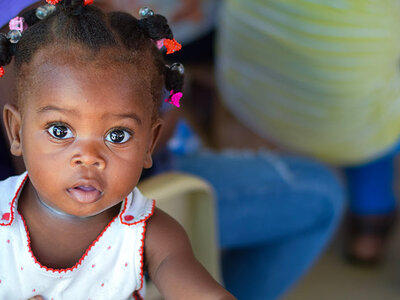Haiti
- 5.7 million
- people facing acute hunger
- 2 million-plus
- people facing emergency levels of hunger
- 11.9 million
- population
Haiti is the poorest country in the Latin America and the Caribbean region and among the poorest in the world.
Hunger is tightening its grip as insecurity, violence and deepening economic woes combine with climate-related shocks and other disasters, forming one of the world's largest humanitarian crises.
Haiti was among countries struck by Hurricane Melissa after it left devastation across the Caribbean in late October and early November 2025. Homes and infrastructure were washed away along the southern coast, which was the most impacted.
The World Food Programme (WFP) had reached 12,700 people with emergency food distributions across grand southern regions by early November, and was scaling up to reach 190,000 people, as part of the response.
The number of food-insecure people in Haiti has more than tripled since 2016. A total 5.7 million Haitians – half the population – do not have enough to eat. Over 2 million of these are facing emergency levels of food insecurity.
The number of internally displaced people has risen to 1.3 million – more than a threefold increase compared to August 2023 – following clashes between armed groups.
In addition, nearly 277,000 children are suffering from acute malnutrition, and 125,000 are severely malnourished.
Consumer prices for major food products are 30 to 77 percent higher than in the Latin America and Caribbean region as a whole. Farmers are also unable to sell their produce due to the blocking of various roads linking the metropolitan area to the regions.
People are also suffering from the effects of various climate shocks.
WFP responds to emergencies while working with the Government to build sustainable systems to address the root causes of food insecurity and promote resilience.
What the World Food Programme is doing in Haiti
-
School meals
-
WFP supports the Ministry of Education in broadening and improving school meals in Haiti. WFP’s Home-Grown School Meals Programme has been expanded to further support the local economy and smallholder farmers, with 70 percent of children eating meals made from locally bought food.
-
Local agriculture and markets
-
Resilience building
-
Social protection and capacity strengthening
-
Emergency preparedness
-
Nutrition
Haiti news releases
Go to pagePartners and donors
Find out more about the state of food security in Haiti
Visit the food security analysis pageContacts
Office
Programme Alimentaire Mondial, Juvenat 7, Pétion-Ville
Port-au-Prince
Haiti







